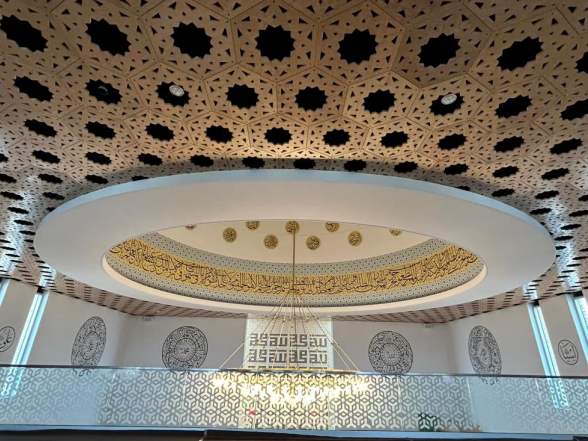Bosniak Islamic and Cultural Center

CONTACT
HOURS
ETIQUETTE
Phone:
(515) 864- 9221
Meeting Times:
Open daily for prayers
Open longer during Ramadan
Friday, Jum’ah at 1:30 PM
Remove shoes upon entering the Mosque
Dress with comfortably with loose fitting clothes
Women should cover heads/hair, arms to wrists, and legs to ankles
Non-Muslims should refrain from prayer
Student Testimonial
By Sean Griffin
Bosnians began immigrating America, as refugees, in the mid 1990s, as the wars in the former Yugoslavia ravaged their homeland. Many of these refugees settled in the greater Des Moines area, perhaps as many as 30,000. Upon arrival, these refugees found themselves missing the cultural and religious practices that once suffused their lives. It did not take them long, therefore, to establish the first Bosnian mosque in Des Moines: Bosniak Islamic and Cultural Center.
Since its establishment in 2005, the Bosniak Islamic and Cultural Center has served the large Bosnian population in greater Des Moines. The mosque lies in a former commercial space at the corner of Hickman and Lower Beaver. Due to the community’s exceptional growth, however, Bosniak Islamic and Cultural Center is now building a new mosque in Granger. This will be the first mosque that is built as a mosque (and also “looks like a mosque”) in the greater Des Moines area. With the construction of this massive facility, the community hopes to provide a greater array of services and to reach a greater array of people.
A small contingent of the community participates in the five daily prayers every day. Even more attend the community prayer on Friday afternoon (Juma’ah). But it is usually not until the breaking-of-the-fast during the month of Ramadan, the feast days after Ramadan and Hajj, and other special religious and cultural celebrations, that the entire community comes out.
A majority of the individuals that practice in the community are Bosnian. Because of this, the community is orientated towards serving the culture and heritage of the Bosnian community in Des Moines. Much of the conversation inside the community takes place in the Bosnian language, aside from prayer, which is conducted in Arabic. The community also holds Bosnian Sunday school for the children of the community. This programming gives an opportunity to continue teaching the shared Bosnian language and history to the next generation.
While the community primarily serves Bosnian-American Muslims, it is still incredibly diverse. Islam itself includes individuals from every corner of globe, not just Bosnia and the Middle East but also Africa, Persia, Indo-Pakistan, and SE Asia (Indonesia, Malaysia). Symbolic of the wide diversity of the Muslim people, the community at the Islamic and Cultural Center Bosniak invites all followers of Islam to practice alongside them, regardless of their cultural heritage.

